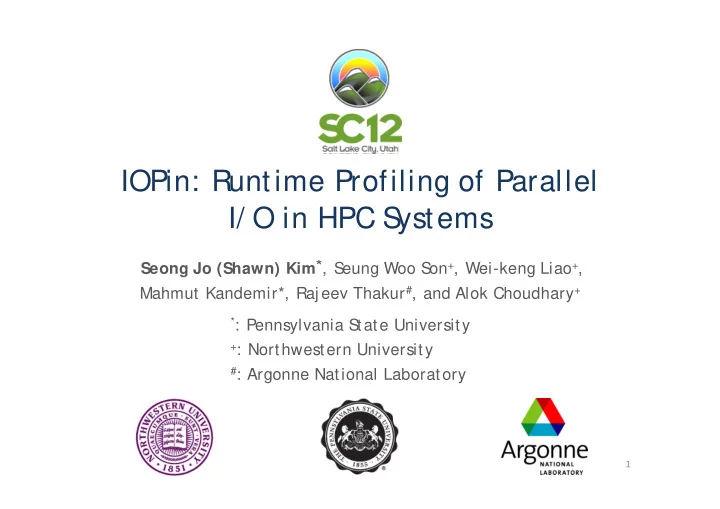

IOPin: Runtime Profiling of Parallel I/ O in HPC S ystems Seong Jo (Shawn) Kim * , S on + , Wei-keng Liao + , eung Woo S Mahmut Kandemir*, Raj eev Thakur # , and Alok Choudhary + * : Pennsylvania S tate University + : Northwestern University # : Argonne National Laboratory 1
Outline Motivation Overview Background: IOPin Technical Details Evaluation Conclusion & Future Work Parallel Data Storage Workshop 12 2
Motivation Users of HPC systems frequently find that limiting the perfor- mance of the applications is the storage system, not the CPU, memory, or network. I/O behavior is the key factor to determine the overall performance. Many I/O-intensive scientific applications use parallel I/O software stack to access files in high performance. Critically important is understanding how the parallel I/O system operates and the issues involved. Understand I/O behavior!!! Parallel Data Storage Workshop 12 3
Motivation (cont’d) Manual instrumentation for understanding I/O behavior is extremely difficult and error-prone. Most parallel scientific applications are expected to run on large-scale systems with 100,000 ↑ processors to achieve better resolution. Collecting and analyzing the trace data from them is challenging and burdensome. Parallel Data Storage Workshop 12 4
Our Approach IOPin – Dynamic performance and visualization tool We leverage a light-weight binary instrumentation using probe mode in Pin. – Language independent instrumentation for scientific applications written in C/C++ and Fortran – Neither source code modification nor recompilation of the application and the I/O stack components IOPin provides a hierarchical view for parallel I/O: – Associating MPI I/O call issued from the application with its sub-calls in the PVFS layer below It provides detailed I/O performance metrics for each I/O call: I/O latency at each layer, # of disk accesses, disk throughput Low overhead: ~ 7% Parallel Data Storage Workshop 12 5
Background: Pin Pin is a software system that performs runtime binary instru- mentation. Pin supports two modes of instrumentation, JIT mode and probe mode. JIT mode uses a just-in-time compiler to recompile the program code and insert instrumentation; while probe mode uses code trampolines (jump) for instrumentation. In JIT mode, the incurred overhead ranges from 38.7% to 78% of the total execution time with 32, 64, 128, and 256 processes. In probe mode, about 7%. Parallel Data Storage Workshop 12 6
Overview: IOPin The pin process on the client creates two trace log info. for the MPI library and PVFS client. – rank, mpi_call_id, pvfs_call_id, I/O type (write/read), latency The pin process on the server produces a trace log info. with server_id, latency, processed bytes, # of disk accesses, and disk throughput. Each log info is sent to the log manager and the log manager identifies the process that has a max. latency. Pin process instruments the target process. Parallel Data Storage Workshop 12 7
High-level Technical Details MPI_File_Write_all I/O lib., or App MPI-IO MPI_File_Write_all Generate trace info. for MPI_File_write_all() LIbrary rank, mpi_call_id, pvfs_call_id #define PVFS_sys_write(ref,req,off,buf,mem_req,creds,resp) PVFS_sys_write PVFS_sys_io(ref,req,off,buf,mem_req,creds,resp, PVFS_IO_WRITE,PVFS_HINT_NULL) The client Pin sends a log PVFS_hints Pack trace info. into Original call flow to the client log manager. PVFS_hints The client log manager rank, mpi_call_id, pvfs_call_id returns a record that has a max. latency for the I/O. Pin call PVFS_sys_io(ref,req,off,buf,mem_req,creds,resp, Pin instruments the Replace PVFS_HINT_NULL PVFS_IO_WRITE, PVFS_hints ) flow corresponding MPI with PVFS_hints process selectively. PVFS Client starting point Client-side Client Log Client PVFS_sys_io(…, hints) Pin Process Manager Client ending point PVFS Server starting point io_start_flow(*smcb, …) flow_callback(*flow_d, …) Server Server ending point Server-side Sever Log Pin Process Manager Disk starting/ending point The server Pin searches hints from *smcb passed trove_write_callback_fn(*user_ptr, …) from the traced process, extracts trace info., gener- ates a log, and sends it to the server log manager. The server log manager identifies/instruments the I/O server that has a max. latency. 8
Computation Methodology: Latency and Throughput For each I/O operation: – the I/O latency computed at each layer is the maximum of the I/O latencies from the layers below. – I/O throughput computed at any layer is the sum of the I/O throughput from the layers below Parallel Data Storage Workshop 12 9
Evaluation Hardware: – Breadboard cluster at Argonne National Laboratory – 8 quad-core processors per node: support 32 MPI processes – 16 GB main memory I/O stack configuration: – Application: S3D I/O – PnetCDF (pnetcdf-1.2.0), mpich2-1.4, pvfs-2.8.2 PVFS configuration: – 1 metadata server – 8 I/O servers – 256 MPI processes Parallel Data Storage Workshop 12 10
Evaluation: S3D-IO S3D-IO – I/O kernel of S3D application – A parallel turbulent combustion application using a direct numerical simulation solver developed in SNL A checkpoint is performed at regular intervals. – At each checkpoint, four global arrays ― represen � ng the variables of mass, velocity, pressure, and temperature ― are wri � en to fi les. We maintain the block size of the partitioned X-Y-Z dimension as 200 * 200 * 200 It generates three checkpoint files, 976.6MB each. Parallel Data Storage Workshop 12 11
Evaluation: Comparison of S3D I/O Execution Time Parallel Data Storage Workshop 12 12
Evaluation: Detailed Execution Time of S3D I/O Parallel Data Storage Workshop 12 13
Evaluation: I/O Throughput of S3D I/O Parallel Data Storage Workshop 12 14
Conclusion & Future Work Understanding I/O behavior is one of the most important steps for efficient execution of parallel scientific applications. IOPin provides dynamic instrumentation to understand I/O behavior without affecting the performance: – no source code modification and recompilation – a hierarchical view of the I/O call from the MPI lib. to the PVFS server – metrics: latency of each layer, # of fragmented I/O calls, # of disk accesses, I/O throughput – ~7% overhead Work is underway: (1) to test IOPin on a very large process counts, (2) to employ it for runtime I/O optimizations. Parallel Data Storage Workshop 12 15
Questions? Parallel Data Storage Workshop 12 16
Recommend
More recommend